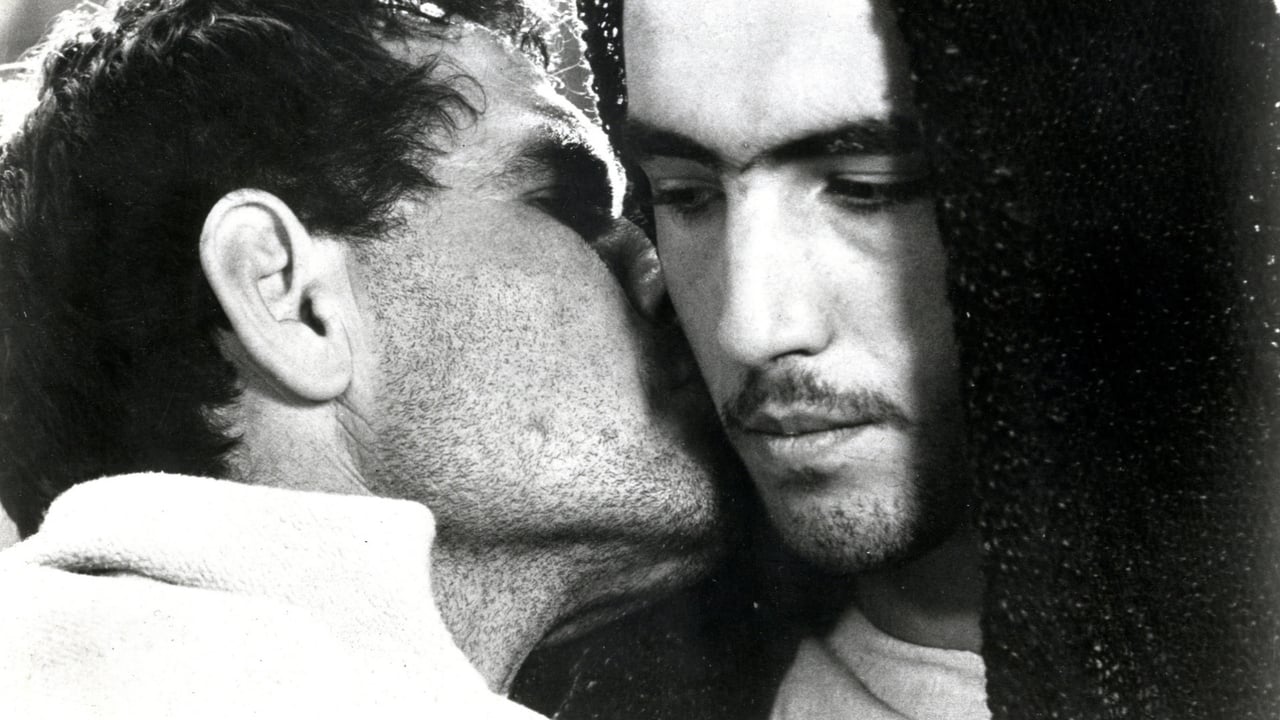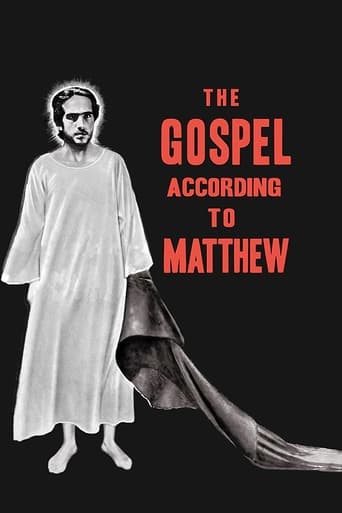

Truly Dreadful Film
... View MoreIt's Difficult NOT To Enjoy This Movie
... View MoreAll that we are seeing on the screen is happening with real people, real action sequences in the background, forcing the eye to watch as if we were there.
... View MoreJust intense enough to provide a much-needed diversion, just lightweight enough to make you forget about it soon after it’s over. It’s not exactly “good,” per se, but it does what it sets out to do in terms of putting us on edge, which makes it … successful?
... View MorePier Paolo Pasolini is considered by many film critics one of the greatest directors in the history of Italian cinema. "The Gospel According to St. Matthew" is the first of his films that I have watched. What strikes me is the combined beauty and simplicity - the composition, the art direction, the costume design, the cinematography and the music. Shot mostly in Italy, with some scenes filmed in Ouarzazate, Morocco, this is an interpretation of the life of Christ well worth watching.
... View MoreThe Gospels are to me some of the dumbest stories ever told: nothing in them makes any sense, thus enforcing my belief that what they try to say is not true. But Pasolini is not a propagandist, it's actually pretty hard to call him a Christian at that: he's an artist and his portrayal of the life of Jesus is between the best ever made precisely because he's not a fanatic believer. You can actually feel respect and awe in his view of the (so called) son of God, and his neorealist style is perfect for the atmosphere of tribal magic evoked by the setting of rural southern Italy, where the movie was filmed. As in most neorealist films, though, the lack of experienced actors and the lavish use of dubbing results in overall clumsy performances, except that of the main character, excellently portrayed by both the -non professional- actor and the -professional- dubber. Technically, the film is strongly flawed, but none of that matters fruition-wise except for some awfully abrupt editing that makes no sense at all. Pasolini's marxist view of the world sides him in favor of the aspects in Christ's doctrine that can be assimilated to that ideology, but everything that's said in the film is taken word-by-word from the book itself, so no-one should accuse him of bias. It is an artistic, realistic and faithful account of what I consider a stupid story, that unfortunately so many people still deem relevant to this day.
... View Morein 2015, Vatican defines it as the best film about Jesus. this is the verdict who grows up, scene by scene, for each viewer when see it. the explanations are many. but not the influences from Piero della Francesca, Masaccio or El Greco, not the landscapes out of times, not the performance of Enrique Irazoqui are not enough for define the secret. a possible start point could be his high simplicity. because, not surprise from Pasolini, the film is a manifesto and a testimony. a testimony about the fundamental values who define us. a manifesto about force of truth. the different marks - Bizantin, Italian Renaissance, looks, clothes, poverty of places and people, the music,the words of Gospel are only bricks for a portrait of Jesus out of ordinaries formulas. it is not exactly a religious film. it is only meeting with yourself. act of faith. and more. because it is not adaptation in real sense but the first contact with the word of Gospel. face to face. as seed. and answer to expectation. sure, it is only an opinion. but the emotion does the film not special but unique. this is the source of its profound authenticity. and feeling of a memorable meeting.
... View MoreThe fact that this is hailed as a "masterpiece" and "one of cinema's greatest achievements" is truly astonishing. Along with Herzorg's "Heart of Glass", Pasolini's "Gospel" is one of the truly abhorrent works of world cinema. I spend my life defending "art-house" cinema against its detractors who claim that it's pretentious and self-indulgent. This is truly one of those films which gives all of world cinema / art-house cinema a bad name.Where to start...? Needless to say, one cannot really lay any blame on the screenplay. Here we have one of the most fascination, stirring, important, enduring and influential stories of all time, without which we would have no Man with No Name, no Star Wars, no Harry Potter. I can honestly say I've seen pre-school productions of the passion which moved me more than this. In fact, the most astonishing thing about this film is that it manages to make you not care about Jesus' life or death at all.The acting is staggeringly bad. The guy who plays Jesus looks the part, but he has one facial expression with which to communicate the entire range of Jesus' experience. One facial expression for the whole movie. Seriously, this guy makes Steven Seagal look like Laurence freaking Olivier. In spite of his oak-like demeanour, Pasolini's Christ manages to come off as angry and intolerant, rather than divine. He shouts, he condemns, he dictates. This is hardly surprising, given Pasolini's radially political sensibilities, but did he have to make Jesus look like a jerk just to appease his own malcontented frustrations?The actors playing the disciples, admittedly, have greater range, though not by much. Typically, their expressions range from confused to bemused. What's worse, they look like a bunch of Italian rent boys; all designer stubble and greasy hair. One of them has more wax in his hair than Elvis, which is fascinating given that the film is set 2000 years ago.This brings me to one of my biggest problems with this film; the countless anachronisms. Costume design is all over the place - no two people look like they come form the same period or region. The music used ranges from traditional Congolese songs to Negro-spirituals to European Baroque choral music. Many critics lauded this "eclectic" use of costume and music. For me, hearing Odetta singing "Motherless Child" while I'm looking a Jesus clearly in his mother's arms while she wears Byzantine-era clothing is plain stupidity. Frankly, it's also a bit of an insult to the song, which is about black children who were taken from their parents as infants to be slaves. Is Pasolini comparing the plight of the Jews to the plight of early slaves in America? Frankly, based on the evidence so far, that would be giving him way too much credit.I am also confused as to the presence of a female angel, since none are ever mentioned in the book of Matthew or any other book. This wouldn't bother me per se, were it not for the fact that, this glaring error notwithstanding, Pasolini deliberately stuck to the gospel verbatim, even going as far as to use no dialogue aside from that found in the book of Matthew. For this, the film suffers even more. I hardly think Matthew was worried about the book's validity as a screenplay when he was writing it, so this pious insistence on sticking to his words is absurd, and totally out of keep with the other "stylistic" choices the film makes, namely the rampant anachronisms.Continuity and sound-dubbing are hilariously bad; one of my favourite moments is when we see a man playing with his baby. The baby looks annoyed and grumpy, yet the image is complimented with the classic baby- giggling effect you get in diaper commercials. When Jesus is a baby, Mary is played by a girl who can't have been more than 15 years old. When Jesus is an adult - some 30ish years later - Mary is played by Pasolini's mother, who was almost 70 years old at the time. Are we supposed overlook the fact that Mary has bizarrely aged 55 years? If so, why? What is Pasolini's point in using his own mother as the mother of Christ? Surely an atheist, Marxist homosexual would have no desire to compare himself to Christ... Frankly, I don't care enough to think about it.The camera operator was clearly either drunk or a child. On at least two occasions he pans to an empty space before clumsily fumbling up or down toward the person or thing he was supposed to be filming. One has to wonder, why on earth didn't Pasolini simply do another take? Was he in a hurry? I can only deduce that he was, as the whole film is made in such a slap-dash way, it's as if he simply didn't care what ended up on the screen. And there we are again, not caring. Pasolini has managed to make me completely indifferent to what is supposed to be the most moving story ever told.Put simply, this film is an abomination. An insult to cinema and an insult to anybody who has two-braincells to rub together. Avoid!
... View More